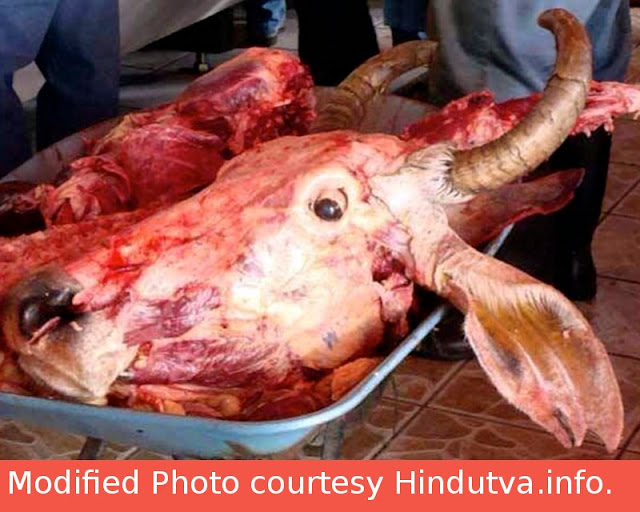#082, Kindness to animals and kindness to humans
REVIEW NO 82
Though the Christian missionaries and Swami Vivekananda were at loggerheads during his lifetime, they have certain things in common. The first among them is with regard to kindness:
Both Vivekananda and Jesus preach compassion and kindness. But their kindness has a strong boundary wall. It extends only kindness to fellow humans and not kindness to animals.
First we shall start with Jesus. Here is a link which contains a thoroughly discussed response to an Animal Rights Group by a Church of Christ using bible as authority.
http://www.lavistachurchofchrist.org/LVarticles/AnimalRightsandtheBible.htm
From the linked article, it can be found that Christ had no objection to slaying of animals. It is also said that the seventh of the Tenth Commandment "Thou shalt not kill" applies only to killing a man (homicides/murders). According to them, God sanctioned eating specified animals.
VIVEKANANDA THEORY QUOTE
VIVEKANANDA in his "Practical Vedanata".
THIS BLOGGER'S OBSERVATIONS
1. Kindness to humans and kindness to animals are not mutually exclusive. A person who at stage 1, is kind to animals, can try to be kind to humans as a part of his stage 2 efforts.
2. A person who at his stage 1 is kind to humans, can try to be kind to animals in his stage 2.
3. A person who is kind both to humans and animals his stages 1 and 2 will be complete and he can proceed to stage 3, some other noble ideal.
4. Thus there is no need to give up the actual so as to go to something higher.
5. Those who do not want to try either stage 1 or stage 2, for them also there is nothing like right or wrong. All these self-control exercises are purely personal, and any discussion is just to create awareness and not to impose views of one group on another.
6. 84% of Indians (as per one study) and nearly 99% of the world's humans including Buddhists are Non-Vegetarians. Hence, the arguments of the Christian missionaries and the Swami will appeal to them easily.
Though the Christian missionaries and Swami Vivekananda were at loggerheads during his lifetime, they have certain things in common. The first among them is with regard to kindness:
Both Vivekananda and Jesus preach compassion and kindness. But their kindness has a strong boundary wall. It extends only kindness to fellow humans and not kindness to animals.
First we shall start with Jesus. Here is a link which contains a thoroughly discussed response to an Animal Rights Group by a Church of Christ using bible as authority.
http://www.lavistachurchofchrist.org/LVarticles/AnimalRightsandtheBible.htm
From the linked article, it can be found that Christ had no objection to slaying of animals. It is also said that the seventh of the Tenth Commandment "Thou shalt not kill" applies only to killing a man (homicides/murders). According to them, God sanctioned eating specified animals.
VIVEKANANDA THEORY QUOTE
VIVEKANANDA in his "Practical Vedanata".
"... If man's life is immortal, so also is the animal's. The difference is only in degree and not in kind. The amoeba and I are the same, the difference is only in degree; and from the standpoint of the highest life, all these differences vanish. A man may see a great deal of difference between grass and a little tree, but if you mount very high, the grass and the biggest tree will appear much the same. So, from the standpoint of the highest ideal, the lowest animal and the highest man are the same. If you believe there is a God, the animals and the highest creatures must be the same. A God who is partial to his children called men, and cruel to his children called brute beasts, is worse than a demon. I would rather die a hundred times than worship such a God. My whole life would be a fight with such a God But there is no difference, and those who say there is, are irresponsible, heartless people who do not know. Here is a case of the word practical used in a wrong sense. I myself may not be a very strict vegetarian, but I understand the ideal. When I eat meat I know it is wrong. Even if I am bound to eat it under certain circumstances, I know it is cruel. I must not drag my ideal down to the actual and apologise for my weak conduct in this way. The ideal is not to eat flesh, not to injure any being, for all animals are my brothers. If you can think of them as your brothers, you have made a little headway towards the brotherhood of all souls, not to speak of the brotherhood of man! That is child's play. You generally find that this is not very acceptable to many, because it teaches them to give up the actual, and go higher up to the ideal. But if you bring out a theory which is reconciled with their present conduct, they regard it as entirely practical. ..."
THIS BLOGGER'S OBSERVATIONS
1. Kindness to humans and kindness to animals are not mutually exclusive. A person who at stage 1, is kind to animals, can try to be kind to humans as a part of his stage 2 efforts.
2. A person who at his stage 1 is kind to humans, can try to be kind to animals in his stage 2.
3. A person who is kind both to humans and animals his stages 1 and 2 will be complete and he can proceed to stage 3, some other noble ideal.
4. Thus there is no need to give up the actual so as to go to something higher.
5. Those who do not want to try either stage 1 or stage 2, for them also there is nothing like right or wrong. All these self-control exercises are purely personal, and any discussion is just to create awareness and not to impose views of one group on another.
6. 84% of Indians (as per one study) and nearly 99% of the world's humans including Buddhists are Non-Vegetarians. Hence, the arguments of the Christian missionaries and the Swami will appeal to them easily.



Comments